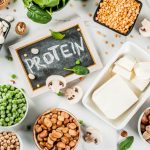Key Points
-
Your body needs carbs to fuel your working muscles.
-
Protein is there to help build and repair.
-
Get a combination of the protein and carbs in your body before and after working out to help with muscle building and repair, muscle soreness, and overall goals.
-
Getting in enough total daily protein and carbohydrates is just as or even more important for muscle growth and reaching your fat loss goals.
-
Remember that these are only guidelines, and not the be all end all (although they are supported by research). The beauty of it all is that everyone’s body is different and will have specific needs and preferences (that may change over time as well). Listen to your body, and tweak your plan with your dietitian based on what works best for you.
Pre-workout Timing
-
Ideally, you should fuel your body about 1 to 3 hours pre-workout, depending on how your body tolerates food. Experiment and see what time frame works best for your body.
-
If it’s within an hour, you’re going to want something smaller and quickly absorbing. If it’s within 2-3 hours, you’ll want a larger, more balanced meal with a bit more protein and fibre.
Pre-workout Fuel Suggestions
-
Apple or banana and peanut or almond butter
-
1-2 tbsp unsalted nuts and 2-4 tbsp raisins or other dried fruit (two parts raisins: one part nuts)
-
Peanut butter and a small banana
-
Smoothie with fruit (and veggies if you like) and protein powder (water or mylk for liquid)
-
1-2 plain rice cakes topped with nut butter
-
PB&J sprouted grain sandwich or wrap (consume 1-2 hours before due to high fibre content of sprouted grain bread)
If consuming your pre-workout 2-3 hours before:
-
¾ cup beans/peas/lentils on a whole wheat whole grain, or sprouted grain wrap (or in a pita) with veggies
-
Oatmeal with milk of choice, fruit and nuts or seeds
-
4 oz protein (beans, chickpeas, lentils, vegan meat alternatives) with ¾ cup carb (e.g. quinoa, brown rice or potato with skin) and veggie (e.g. sautéed or steamed green beans or spinach)
P.s. Felicia has a completely affordable full meal plan, that has many options for breakfast, lunch, dinner and snacks, for only $15!
Post-workout Timing
-
For strength training: you ideally want something quick absorbing within approximately 20 minutes to one hour post strength training (this isn’t 100% necessary if you don’t have the time or means, but will speed up your progress slightly), and then a balanced combination of protein and carbs within an hour or two.
-
There is emerging research indicating that consuming something within the one hour post workout “anabolic window” isn’t as essential as once thought. What’s more important is getting in enough total daily protein and carbs for fuel and muscle repair/growth. If you can get something quick absorbing within one hour – cool! If not, don’t think it’s going to significantly hurt your progress.
-
-
For cardio: a balanced combination of protein and carbs within an hour is what you want to aim for.
Post-workout Fuel Suggestions
-
20 minutes to 1 hour window after strength training:
-
Post-workout recovery smoothie with fruit and protein powder (water or milk for liquid)
-
Low-sugar chocolate mylk or any flavour protein drink
-
-
1 hour or more after strength training or cardio: ANY of the above pre-workout suggestions!
For Longer Duration Exercise
Carbohydrate ingestion during exercise (such as with sports drinks and sports gels) has frequently been found to result in significantly faster performance during cycling time trials, greater power output during sprints and better maintenance of blood glucose. Doses of 30-70 grams of CHO per hour were commonly used. Carbohydrate intake is not necessary during brief exercise (<45 minutes). However, for high intensity exercise lasting 45 to 75 minutes that is sustained, small amounts of carbohydrate, including mouth rinse, can be recommended.
The Academy of Nutrition and Dietetics, Dietitians of Canada and the American College of Sports Medicine recommend the following:
-
a carbohydrate target of 30-60 g/h during endurance exercise including “stop and start” sports of one to 2.5 hours in duration
-
a carbohydrate target of up to 90 g/h during ultra-endurance exercise greater than 2.5 to 3 hours.
A variety of foods and specialized sports products in either liquid or solid forms can be useful. Athletes should identify a plan that best meets their individual needs for hydration, fuel and gastrointestinal comfort.
Click here to sign up for Sustain Nutrition’s FREE e-Course – ‘Master Healthy Eating and Maximize Your Energy, Even with a Busy Lifestyle’!
Have any questions or need personalized nutrition support? Visit here or contact Felicia, Sustain Nutrition!







